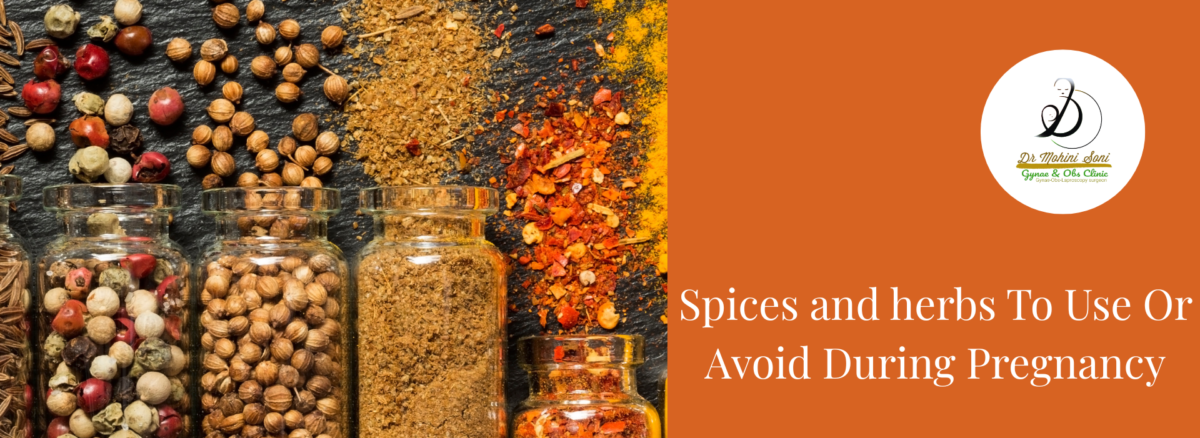Every bite you take during pregnancy matters-not just for you, but for your baby too. And while you’re carefully choosing fruits and supplements, it’s easy to forget the herbs and spices that go into your daily meals. Some are gentle and healing, while others may trigger discomfort or complications. If you’re unsure about what’s safe, especially during a high-risk pregnancy, this blog is for you. Backed by expert insights from Dr. Mohini Soni, one of the best gynecologists in Vasant Kunj, let’s explore the dos and don’ts of spices during pregnancy.
Let’s explore the safe herbs and spices for pregnant women and the ones you may want to keep off your plate for a while.
Spices and Herbs That Are Generally Safe in Pregnancy
- Turmeric (Haldi)
Turmeric is a powerhouse. Known for its anti-inflammatory properties, small amounts used in cooking are safe and even helpful for immunity. But avoid turmeric supplements unless advised by your doctor. - Ginger (Adrak)
Struggling with morning sickness? Ginger is your best friend. It’s known to ease nausea and improve digestion. Fresh ginger tea or ginger in food is usually safe in small amounts. - Cumin (Jeera)
Cumin helps with digestion and bloating-two common complaints in pregnancy. A pinch of roasted cumin powder in your meals or buttermilk can be beneficial. - Cardamom (Elaichi)
Mild, fragrant, and safe-cardamom can help with nausea and improves taste in the mouth. It’s gentle enough for daily use in tea or sweets. - Cinnamon (Dalchini)
In small quantities, cinnamon is safe. It helps regulate blood sugar and adds natural sweetness. But avoid medicinal doses or supplements.
Spices and Herbs to Avoid or Limit During Pregnancy
- Asafoetida (Hing)
While it’s a common tadka ingredient, hing in large quantities can stimulate the uterus and may not be suitable for pregnant women. - Fenugreek (Methi)
Methi seeds are often used in Indian cooking, but high amounts can trigger uterine contractions. Use in moderation and avoid fenugreek supplements. - Ajwain (Carom seeds)
Though it helps with digestion, too much ajwain can lead to gas or discomfort in pregnancy. Small amounts in food are okay, but not in concentrated form. - Aloe Vera (as an herb or juice)
Avoid consuming aloe vera internally during pregnancy-it may cause uterine spasms or even miscarriage in rare cases. - Licorice Root (Mulethi)
Although sweet and soothing, mulethi can increase blood pressure and affect hormone levels. Best to avoid during pregnancy.
When in Doubt, Ask Your Gynecologist
Every pregnancy is different. If you have a high-risk pregnancy-due to diabetes, thyroid, previous miscarriage, or any other reason-it becomes even more important to understand what works best for your body.
Dr. Mohini Soni, a trusted gynecologist in Vasant Kunj, Delhi, offers expert care for all stages of pregnancy. Whether it’s general prenatal guidance or managing a high-risk pregnancy in Delhi, her approach is personalised, practical, and deeply compassionate.
She also specialises in common gynecological surgeries and laparoscopic procedures in Delhi, helping women manage reproductive health with minimal discomfort and faster recovery.
Conclusion
Spices are a beautiful part of Indian culture and cuisine. During pregnancy, the key is moderation and awareness. While many herbs support health and digestion, some might be too strong or risky in higher doses.
If you’re ever unsure, especially with herbal teas, home remedies, or supplements, it’s always best to consult your gynecologist.
Expecting and looking for expert pregnancy care in Vasant Kunj?
Book your appointment with Dr. Mohini Soni, one of the best gynecologists in Delhi, for complete guidance-from food choices to safe delivery and beyond.

